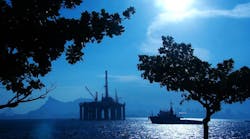OTC 2025: Petrobras CEO outlines company’s aggressive E&P plans
By Bruce Beaubouef, Managing Editor
Petrobras has upped its oil and gas exploration budget to develop new frontiers and expand production, even as it intends to foster the “energy transition” and work towards the Net Zero by 2050 goal.
Those were among the thoughts offered by Petrobras CEO Magda Chambriard at a technical session held on Monday at the Offshore Technology Conference in Houston.
With Jarand Rystad, CEO of Rystad Energy playing an interrogative-moderator role, Chambriad offered her thoughts on new and upcoming field development technologies, the supply chain and Brazil’s local content policies at a technical session entitled “Setting the Scene in Brazil: An Anticipation of What Is Coming.”
Chambriard said that Petrobras will add 14 new platforms within the next five years, with significant drilling and production targets in southeastern basins, the Equatorial Margin off the country’s northern coast, and in other countries as well.
“We see Petrobras as one of the top 10 producers in the world, and one of the top 10 [energy] explorers in the world,” she said. “We will be having 225,000 new barrels coming online this year. This is huge for our company, our country, and the world.”
Chambriard also noted that Petrobras is continuing to develop new technologies that make the production of offshore gas possible in some regions. In the Santos basin, she noted, there is a lot of CO2-rich gas. Technologies like HISEP – which separates the carbon dioxide from the gas and reinjects it into the reservoir – will be key here. “We will need a lot of new technology to develop the presalt,” she said. Last year, Petrobras created a pilot project to install the high-pressure oil and gas separation technology at the Mero field in the Santos basin. If the technology proves successful, it could be applied to Petrobras’ other oilfields, reducing the company’s carbon footprint. “We are very proud of this technology,” Chambriard said.
Rystad then asked Chambriad about the supply chain, and its escalating cost. He noted that in some regions, oilfield equipment and service costs were still rising even as oil prices have been falling in recent weeks. The Petrobras CEO responded that she had been “challenging our staff as well as our suppliers to confront these issues. We have to adjust. This is life in the oil industry. We have long-term projects that require us to be both flexible and resilient, and our suppliers should also be flexible and resilient.”
Chambriad also said that Petrobras has not abandoned the Net Zero by 2050 goal. She further noted that Petrobras has been engaged in the “energy transition” for many years. In the 1970s, Petrobras played a crucial role in developing Brazil's ethanol industry in response to the oil crisis. The government's Proálcool program, launched in 1975, aimed to reduce reliance on imported oil by promoting the use of domestically produced ethanol. Petrobras provided financial support for distillery construction and helped ensure a domestic market for ethanol by mandating blending with gasoline.
Last November, Chambriard started discussions with companies such as Raízen, bp and Inpasa to explore potential joint ventures in the ethanol market. This move signaled a significant shift in Petrobras’ focus as the company aims to position itself as a major player in the biofuels industry. Petrobras is now targeting renewable energy, and in particular ethanol, as part of its broader strategy to diversify the company’s portfolio. But it’s not just ethanol, Chambriard noted – solar, hydrogen, biogas and CCUS “are all part of our plan.” All of these renewable energy sources, she said, “will contribute to Net Zero by 2050.”
Rystad then queried Chambriard about Brazil’s new local content policies. Last year, Brazil approved a new law, 15,075/2024, that significantly altered local content requirements and production sharing agreements in the oil and gas sector. The law aimed to boost investments and optimize oil and gas exploration and production activities by allowing for greater flexibility in local content compliance. Specifically, the law allows for the transfer of local content surpluses between different exploration and production contracts, including those without minimum local content requirements. This means that if a consortium exceeds the mandatory minimum purchase rate for Brazilian products, the excess can be passed on to other contracts in the form of monetary value. Additionally, the law expands the definition of local content to include tankers and maritime support vessels produced in Brazil, and establishes minimum local content rates for these vessels. “This new law is good for everybody,” Chambriad observed. “It makes things easier and more profitable for everyone.”
Rystad also queried Chambiard about Petrobras’ plans for oil and gas development outside Brazil. “Much of our focus in recent years has been on Brazil’s presalt reserves,” Chambriard observed. “But we have to explore. There is no future without exploration.” The Equatorial Margin is one new area that Petrobras can explore offshore Brazil, but she conceded that “we will have to go abroad and look for new frontiers.”
She cited the West Africa margin and offshore Egypt as areas of potential future exploration for Petrobras. She noted that Egyptian officials had already approached Petrobras wanting to discuss the possibilities for offshore development.
And, Petrobras has been working with Colombia to develop its offshore reserves. Late last year, Petrobras announced that its consortium with Ecopetrol had confirmed the “largest gas discovery in Colombia’s history” with the drilling of the Sirius-2 well in the GUA-OFF-O Block offshore Colombia. Drilling results confirmed volumes of more than 6 trillion cubic feet of gas in the location, which could increase Colombia’s current reserves by 200%.
“The gas discovery there is really good,” Chambriard said. That gas will need a pipeline to bring it to market, she added. “We will keep exploring that same block,” she said. “We could even export some gas to Brazil” if the reserves are large enough, she added.
About the Author
Bruce Beaubouef
Managing Editor
Bruce Beaubouef is Managing Editor for Offshore magazine. In that capacity, he plans and oversees content for the magazine; writes features on technologies and trends for the magazine; writes news updates for the website; creates and moderates topical webinars; and creates videos that focus on offshore oil and gas and renewable energies. Beaubouef has been in the oil and gas trade media for 25 years, starting out as Editor of Hart’s Pipeline Digest in 1998. From there, he went on to serve as Associate Editor for Pipe Line and Gas Industry for Gulf Publishing for four years before rejoining Hart Publications as Editor of PipeLine and Gas Technology in 2003. He joined Offshore magazine as Managing Editor in 2010, at that time owned by PennWell Corp. Beaubouef earned his Ph.D. at the University of Houston in 1997, and his dissertation was published in book form by Texas A&M University Press in September 2007 as The Strategic Petroleum Reserve: U.S. Energy Security and Oil Politics, 1975-2005.



